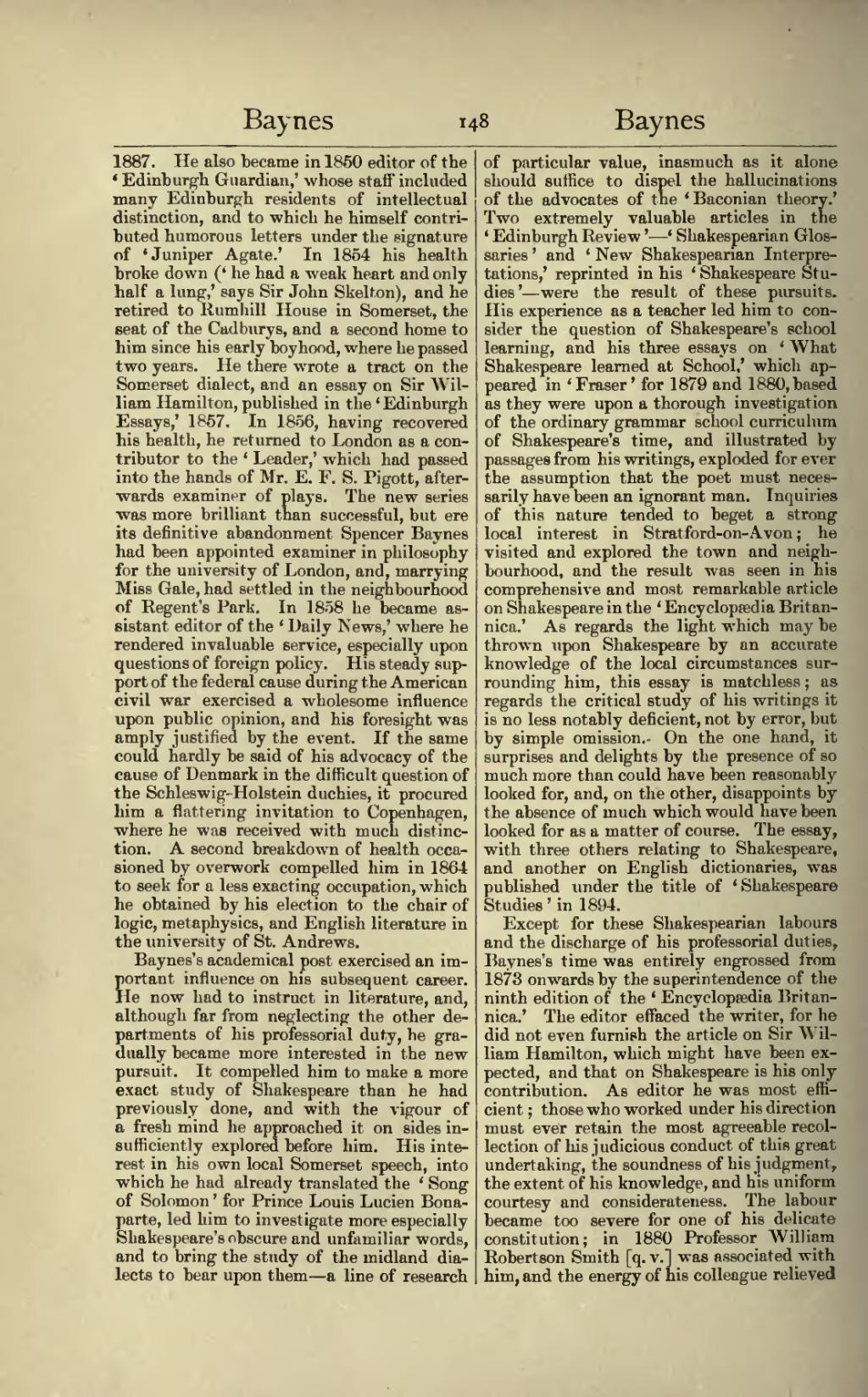1887. He also became in 1850 editor of the 'Edinburgh Guardian,' whose staff included many Edinburgh residents of intellectual distinction, and to which he himself contributed humorous letters under the signature of 'Juniper Agate.' In 1854 his health broke down ('he had a weak heart and only half a lung,' says Sir John Skelton), and he retired to Rumliill House in Somerset, the seat of the Cadburys, and a second home to him since his early boyhood, where he passed two years. He there wrote a tract on the Somerset dialect, and an essay on Sir William Hamilton, published in the 'Edinburgh Essays,' 1857. In 1856, having recovered his health, he returned to London as a contributor to the 'Leader,' which had passed into the hands of Mr. E. F. S. Pigott, afterwards examiner of plays. The new series was more brilliant than successful, but ere its definitive abandonment Spencer Baynes had been appointed examiner in philosophy for the university of London, and, marrying Miss Gale, had settled in the neighbourhood of Regent's Park. In 1858 he became assistant editor of the 'Daily News,' where he rendered invaluable service, especially upon questions of foreign policy. His steady support of the federal cause during the American civil war exercised a wholesome influence upon public opinion, and his foresight was amply justified by the event. If the same could hardly be said of his advocacy of the cause of Denmark in the difficult question of the Schleswig-Holstein duchies, it procured him a flattering invitation to Copenhagen, where he was received with much distinction. A second breakdown of health occasioned by overwork compelled him in 1864 to seek for a less exacting occupation, which he obtained by his election to the chair of logic, metaphysics, and English literature in the university of St. Andrews.
Baynes's academical post exercised an important influence on his subsequent career. He now had to instruct in literature, and, although far from neglecting the other departments of his professorial duty, he gradully became more interested in the new pursuit. It compelled him to make a more exact study of Shakespeare than he had previously done, and with the vigour of a fresh mind he approached it on sides insufficiently explored before him. His interest in his own local Somerset speech, into which he had already translated the 'Song of Solomon' for Prince Louis Lucien Bonaparte, led him to investigate more especially Shakespeare's obscure and unfamiliar words, and to bring the study of the midland dialects to bear upon them — a line of research of particular value, inasmuch as it alone should suffice to dispel the hallucinations of the advocates of the 'Baconian theory.' Two extremely valuable articles in the 'Edinburgh Review' — 'Shakespearian Glossaries' and 'New Shakespearian Interpretations,' reprinted in his 'Shakespeare Studies' — were the result of these pursuits. His experience as a teacher led him to consider the question of Shakespeare's school learning, and his three essays on 'What Shakespeare learned at School,' which appeared in 'Fraser' for 1879 and 1880, based as they were upon a thorough investigation of the ordinary grammar school curriculum of Shakespeare's time, and illustrated by passages from his writings, exploded for ever the assumption that the poet must necessarily have been an ignorant man. Inquiries of this nature tended to beget a strong local interest in Stratford-on-Avon ; he visited and explored the town and neighbourhood, and the result was seen in his comprehensive and most remarkable article on Shakespeare in the 'Encyclopædia Britannica.' As regards the light which may be thrown upon Shakespeare by an accurate knowledge of the local circumstances surrounding him, this essay is matchless ; as regards the critical study of his writings it is no less notably deficient, not by error, but by simple omission.- On the one hand, it surprises and delights by the presence of so much more than could have been reasonably looked for, and, on the other, disappoints by the absence of much which would have been looked for as a matter of course. The essay, with three others relating to Shakespeare, and another on English dictionaries, was published under the title of 'Shakespeare Studies' in 1894.
Except for these Shakespearian labours and the discharge of his professorial duties, Baynes's time was entirely engrossed from 1873 onwards by the superintendence of the ninth edition of the 'Encyclopædia Britannica.' The editor effaced the writer, for he did not even furnish the article on Sir William Hamilton, which might have been expected, and that on Shakespeare is his only contribution. As editor he was most efficient ; those who worked under his direction must ever retain the most agreeable recollection of his judicious conduct of this great undertaking, the soundness of his judgment, the extent of his knowledge, and his uniform courtesy and considerateness. The labour became too severe for one of his delicate constitution; in 1880 Professor William Robertson Smith [q. v.] was associated with him, and the energy of his colleague relieved
